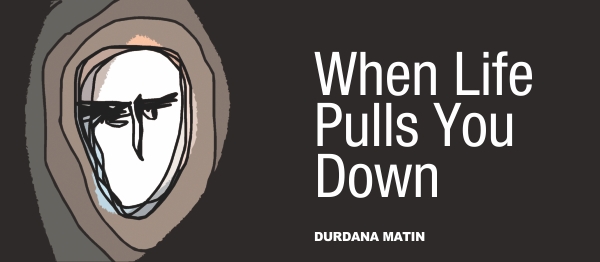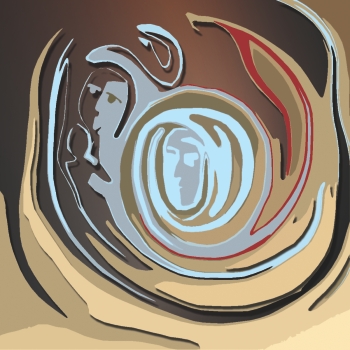| Home - Back Issues - The Team - Contact Us |
 |
| Volume 10 |Issue 35 | September 16, 2011 | |
|
|
Impressions
The reader, who is willing to listen to this monologue, will surely be disappointed: for it isn't a story of hope and jubilation. It's the story of a grieving mother who is ventilating her sorrow and pain. Often fear and despair fleck the face of flickering hope. Fear looms large, the fear of being pushed to the edge from where the thin line between sanity and insanity begins to blur. Many subtexts surface at this juncture: the existentialist's dilemma, the sordidness, shame and pain, helplessness discovered at the worst possible time of life; faith and relationship are called into question! There is no running away from this cul de sac. I first came to hear about autism in the film Rainman. At that point of time it never occurred even in my wildest dream that I myself was going to love someone in my life more than anything else in the world who would be suffering from this lifelong condition! Then my son was born a few years later! My son did not have autism when he was born. As he had birth trauma he was put on antibiotics. That traumatic period over, I thought that the worst was over, not knowing what was coming next! He was a very beautiful and impressive child. I did not know what I had really done to deserve him. He made a very smooth transition from the pre-lingual to the lingual stage. But as he was immunologically weak now I understand that there were many killers lying in wait for him.
I moved in with my parents. We left no effort spared to get a correct diagnosis, which swayed between autism and seizure disorder. I joined some parents' groups of these disorders on the internet. There I came to know of some ground-breaking research on autism. I thought it was not too late to lose heart as he was very little at that time. I contacted a renowned pediatric neurologist in Chicago. Until then we were not aware that taking my child to the US for treatment could be another insurmountable hurdle for me. I was awakened to the fact that nothing in this world was meant for my little child. When we were refused the visa at the US embassy, we took him to Singapore instead. There when the nurses wrapped him with a bed sheet to draw blood from him he let out a heartrending cry saying 'Bachao' (save me) ! He had broken three long years of silence! My heart broke when he cried, 'ma bachao'. It seemed the stressful situation had forced him to speak out. Many years of struggle with my child's disorder have passed. All perspectives are different for you once you have an autistic child, but your position is far better in his childhood than in his adoles cence. When your son is at the threshold of childhood and boyhood, his autistic awkwardness becomes increasingly evident in his behaviour. He will not fit anywhere! If you don't own a house, there are very few people who will let a house to you. In our country there is hardly any service for them. The children remain almost, always confined. Their non-compliance and resistance keep others away from them, and they get bored. These days my son has been having regular meltdowns. I feel so helpless when he bangs his head against the wall. I can't go near him! Sometimes I see my son in the position of Kafka's Gregor Samsa facing up to the cruel indifferences of the world to which he really doesn't matter.
I'm living with lupus, stroke and AVN. My son would be far better off if he had not been born to a sick mother! But who can know the future? A new layer of hell opens up each day. Sometimes the marriage is at stake; accusations and recriminations become frequent and loud. In this type of incomprehensible situation you would look for the cause! Many skeletons from your unconscious past would pop up. I try not to yield. I try to empower myself even in such adversity. I won't be able to do whatever little I can for my son if I'm not happy myself. But now things are falling apart. I don't blame God for it; if it had not been me, then it would have been somebody else. I go back to the time when he started talking, when he called me 'Ma', when once he asked me to bring a picture book of 'Meao' for him, when he could answer the questions he was asked. I still remember that soft, lilting voice! He gave me so much joy! Though there has always been an urge to capture my rambling thoughts about this very personal and sensitive issue, an issue so close to my heart, something always held me back. Now I feel free in a strange way. Any kind of writing I know is cathartic, and a healing process starts when you unburden yourself, when you begin to share. The writer is Associate Professor, Department of English University of Chittagong.
Copyright (R) thedailystar.net 2011 |

 The first onslaught came when he was only nineteen months old. It was a fever, though not too high. But I noticed that he had undergone a gradual metamorphosis in less than a month. Until then he used to speak in sentences. I was beginning to have an uneasy feeling. At toy stores I would be at a loss to know what would be good for him, for I could not think of anything that he could play with. The words he uttered got distorted and, gradually, he was losing all his links with the real world. He didn't have a hearing problem. He loved music; he would come running from anywhere, like one possessed, to listen to his favourite tune being played. After a couple of months we took him to a hospital where one of the doctors, on examining him, suspected that he might have autism. By that time I had had at least as much familiarity with the disorder and the term as could shock me when the doctor made the clinical disclosure. From that particular moment on, my whole world changed forever. There was no escape for my poor little boy; not anymore, after the doctors passed their sentence on him.
The first onslaught came when he was only nineteen months old. It was a fever, though not too high. But I noticed that he had undergone a gradual metamorphosis in less than a month. Until then he used to speak in sentences. I was beginning to have an uneasy feeling. At toy stores I would be at a loss to know what would be good for him, for I could not think of anything that he could play with. The words he uttered got distorted and, gradually, he was losing all his links with the real world. He didn't have a hearing problem. He loved music; he would come running from anywhere, like one possessed, to listen to his favourite tune being played. After a couple of months we took him to a hospital where one of the doctors, on examining him, suspected that he might have autism. By that time I had had at least as much familiarity with the disorder and the term as could shock me when the doctor made the clinical disclosure. From that particular moment on, my whole world changed forever. There was no escape for my poor little boy; not anymore, after the doctors passed their sentence on him.  Everybody wants their children to outlive them; but we neither want to die before our child nor him before us. Not long ago once I strayed into a very beautiful dream; there I saw my son talking. When it was hard to tell the dream state from my real existence then the helplessness and the loneliness of a boy somewhere else suddenly filled my consciousness with a terrible pain. As much as I loved that boy in my dream, I knew I couldn't and wouldn't ever be able to live without the one who was suffering.
Everybody wants their children to outlive them; but we neither want to die before our child nor him before us. Not long ago once I strayed into a very beautiful dream; there I saw my son talking. When it was hard to tell the dream state from my real existence then the helplessness and the loneliness of a boy somewhere else suddenly filled my consciousness with a terrible pain. As much as I loved that boy in my dream, I knew I couldn't and wouldn't ever be able to live without the one who was suffering.